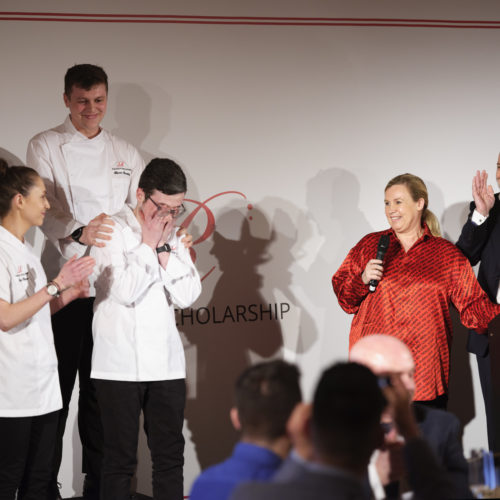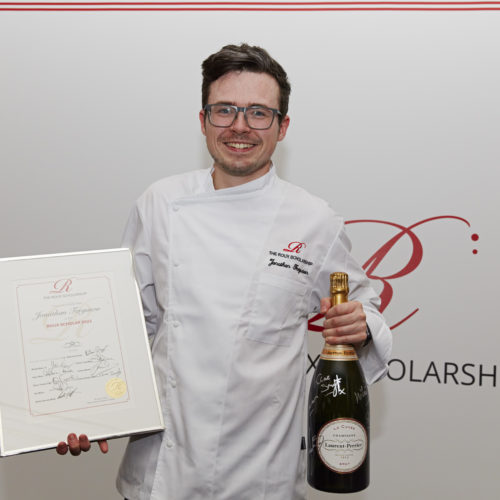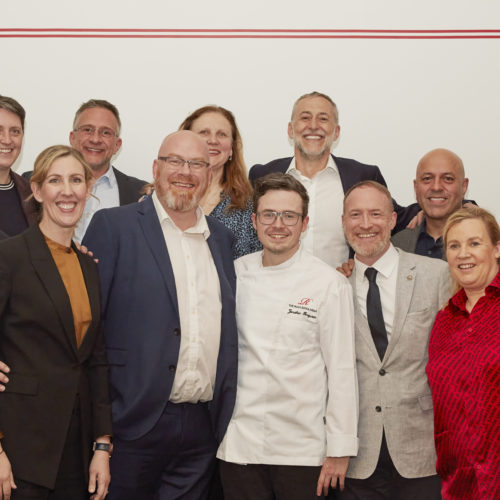2022
Jonathan Ferguson
“Definitely apply: it’s massive effort to do it but I think what it gives back to you is far more than you put in.”
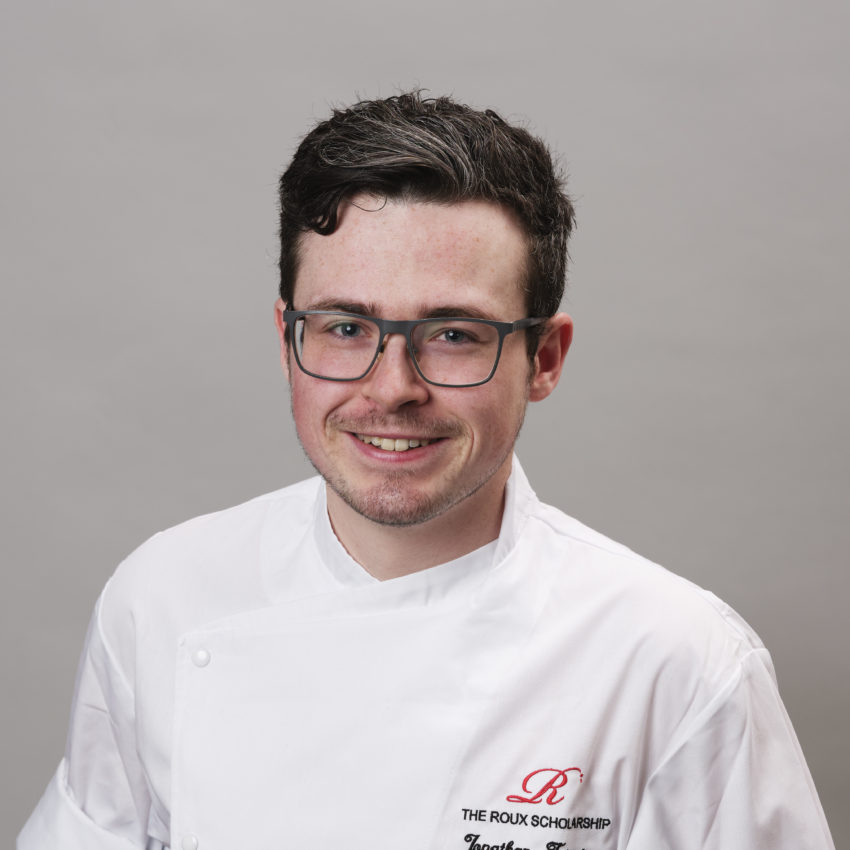
In April 2022, Jonnie Ferguson became the third Scottish chef to scoop the title of Roux Scholar and, in his victory speech, he paid tribute to the first – the much-missed Andrew Fairlie - who had played an inspirational role in his career. Jonnie was competing just six months after his first experience of the Roux Scholarship finals, as the Covid-19 pandemic affected the usual schedule, and he was the only one of the six finalists to have reached the finals before. The experience helped him cook with confidence and he was ecstatic to be announced the winner at the prestigious award ceremony that evening.
Jonnie grew up in Renfrewshire and Inverclyde and started cooking at a young age. Inspired by TV programmes with James Martin, Keith Floyd and the Hairy Bikers, he was encouraged to try out baking and other recipes even at the age of eight or nine years old, moving on to cooking full Christmas dinners soon after. After completing his Higher Exams, he moved for training and an apprenticeship working under Adam Byatt at Trinity in Clapham and stay with his uncle Calum in London. However, the pressure of life in a new city at such a young age led him to question his career choice and so after seven months he moved back to Scotland intending to go to university to study brewing and distilling at Herriot Watt University. While he was waiting for applications to open again, he took a role as commis chef at Cail Bruich, working under Chris Charalambous, where he rediscovered his love of cooking and never resumed his plan for university. After a year at Cail Bruich, Jonnie was recommended for a role at Gleneagles with Alan Gibb. Just before he started, Alan thought Jonnie may be better suited to working at Restaurant Andrew Fairlie and generously found him a role there with Stephen McLaughlin. From there, Jonnie spent time in each section of the kitchen and was encouraged to develop by both Andrew Fairlie and Stephen McLaughlin, both of whom he has huge respect and admiration. Once he felt he had done his time on each section and learned all he could, Jonnie took a role as Senior Chef de Partie at The Raby Hunt in Darlington where he enjoyed learning how another restaurant operated. It was during his time there that Jonnie qualified for the Roux Scholarship 2020, the finals for which – due to the coronavirus pandemic – didn’t take place until the autumn of 2021. After reaching the final for that competition and benefiting from the experience, he took a new role as Junior Sous Chef at The Glenturret Lalique Restaurant and Head Chef Mark Donald supported him in applying for the Roux Scholarship again, just six months after qualifying before. Jonnie’s skill, talent and experience helped stay focussed and he cooked the most impressive dish on the day.
Among Jonnie’s other accolades is winning the British Culinary Federation's Young Chef of the Year 2015, Scottish Junior Chef of the Year 2015 and Game Chef of the year 2018.
In early 2023, Jonnie conducted his stage at The French Laundry in Yountville, California. He followed in the footsteps of fellow scholar Hrishikesh Desai who did his stage there in 2009. Find out more about his experience here.
In spring 2024, Jonnie returned to California for a permanent role as sous chef at The French Laundry.
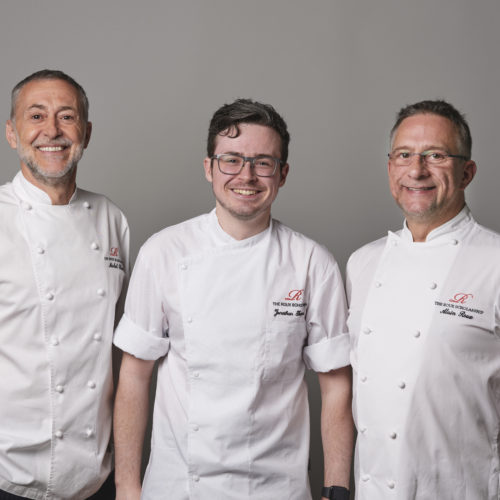
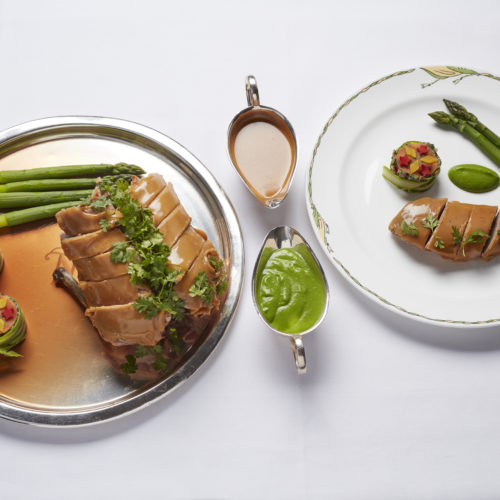
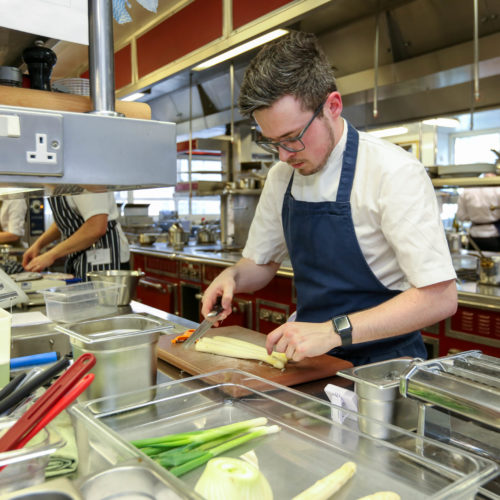
What did you cook in the final?
It was a chaud-froid of Merrifield duck à l’orange, with a chartreuse of asparagus. I had done chaud-froid before, but not with a protein, so in the preparation time I was looking in my books for what to do. In the end though, I went with what I had in my head as I felt more confident cooking something I had my own idea for, rather than trying to piece it together from the books. I had been watching the previous year’s YouTube masterclasses religiously so I was surprised to see chartreuse again as it had been done in 2014, and I thought they wouldn’t repeat it. When I saw that the moulds were smaller, it felt more manageable. In 2014, the chartreuse was around the whole dish of quail and sweetbreads.
What do you remember most about the final in 2022?
The final itself felt different to the year before just because we had one dish to focus on (there were two separate dishes in 2021). With one dish, it is easier to work out your timings and there are fewer processes going on in your head. The chaud-froid is very different, too. When you serve something cold, the process is flipped on its head: you are doing all the hot cooking at the start and then bringing it together at the last minute. At the briefing, the judges were giving little clues about what to do, which I’m not sure the other finalists picked up on, but they said ‘Think about how you’re serving the duck and how are you going to cook it?’ which was a hint that we needed to give it a little longer so it wasn’t too rare or pink when served cold.
What were the highlights of the final cook-off?
When we had to draw our numbers out of a hat, or rather the champagne bucket, for the stations we’d be working at, I drew out the same one I got the year before. Then I pulled out the number for the commis chef (who are students at Westminster Kingsway College) who’d be helping me, and by complete fluke, it was also the same as the year before. It was a 19-year-old guy called Joe Slater, and so to have someone there working beside me, someone who kind of knows how I work, someone I knew I could trust with certain jobs because I already knew what kind of level he was at, it was just so lucky. It was also really nice to see the difference in him six months on and see just how much he's improved in certain ways. And he was just a bit more confident because we'd met each other before, there was less nerves for him. He was smiling alongside me the whole day, just cracking on, enjoying the whole process of it.
How many times did you enter?
My first paper entry was in 2019 when the recipe challenge was for hogget, but I didn’t get through the paper judging. Looking back, it feels like my dish wasn't quite ‘enough’. It was delicious to eat, but it's easy to see that when you're standing there actually eating it, but when when you're trying to showcase a dish and catch a judge's attention, I can easily see why mine was passed over quite quickly. That was something to take forward the following year, and I made sure my dish had something a little bit exciting about it to make it stand out that little bit more. It worked and I got through the paper entry to reach the regional final, with the recipe for hake, leeks and clams, then I got the final, which was then obviously last year after all the delays with Covid. I was pretty gutted to not win, but at the same time, it worked out quite nicely the way timings worked in terms of it being so close together, only six months apart between the two finals. It kept that momentum going, which was really good.
What advice would you give applicants?
Definitely apply: it’s massive effort to do it but I think what it gives back to you is far more than you put in. It really is that valuable, even the process, even if you just get to the regional final. If you manage to get through the paper entry, then the feedback you get cooking for those judges, that calibre of chefs, that's something that sticks with you forever. It’s also great for the people that you meet; I still keep in touch with plenty of people that I've met in the regional finals and the two finals. That's a really nice thing to have as well. There’s plenty of press coverage too. I found that was a big help to me to just get used to how to speak to journalists and deal with interviews, trying to fit them into my own schedule work as well. That was all invaluable practice.
Who are your culinary heroes?
Andrew Fairlie: he was just such an inspirational boss, the way he was in the kitchen, the way he carried himself, the way he handled everything. If I can one day be as half a good a boss as he was, then I’ll be doing well. Then of course Stevie McLaughlin; 90% of the things that I learned at Restaurant Andrew Fairlie were through Stevie and what he'd learned from Chef Andrew when he was coming up through his kitchen. As far as I'm concerned, it's my name that’s won the Roux Scholarship but his name should be up there next to mine, he deserves a massive amount of credit for me winning. It's nice as well to have someone who, even though I left Restaurant Andrew Fairlie, we still keep in touch and text every day. If I ever have had an issue since I've left, I can always phone and he picks up, he always makes time for me. Throughout the 2022 competition, Mark Donald was really the person I needed to just kick me over the line with love and to just give me that extra motivation to get things done. He was pretty inspirational; he came in on his days off, was there until midnight. He helped me clean the kitchen afterwards, taste things for me and he was just honest with me. If something wasn't right with my dish for the semi-final, he would just tell me, which was what I needed to hear. It's very important to find that kind of person that's going to help you through the process. Winning the scholarship is definitely not something that someone achieves on their own.
